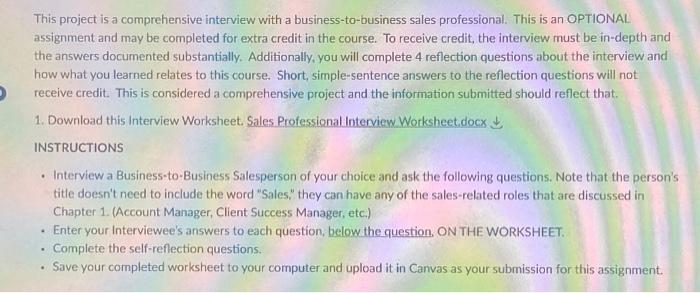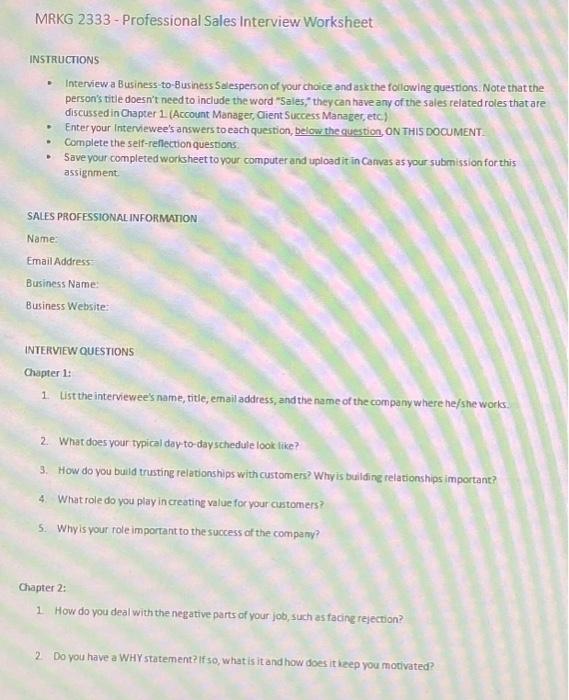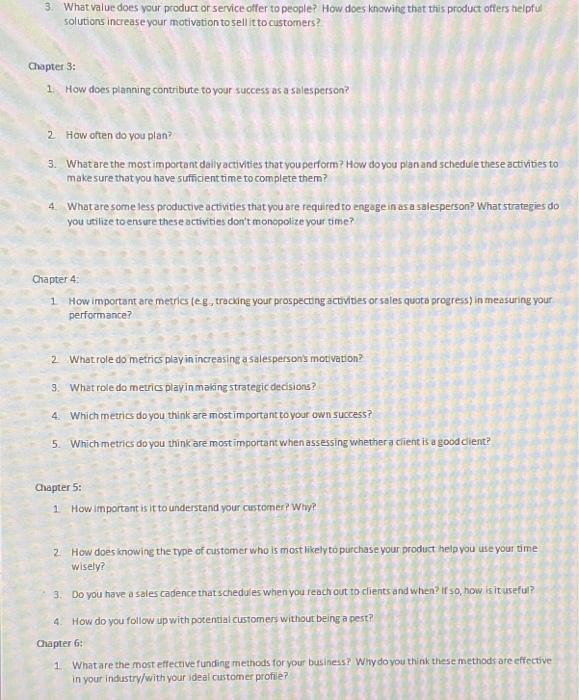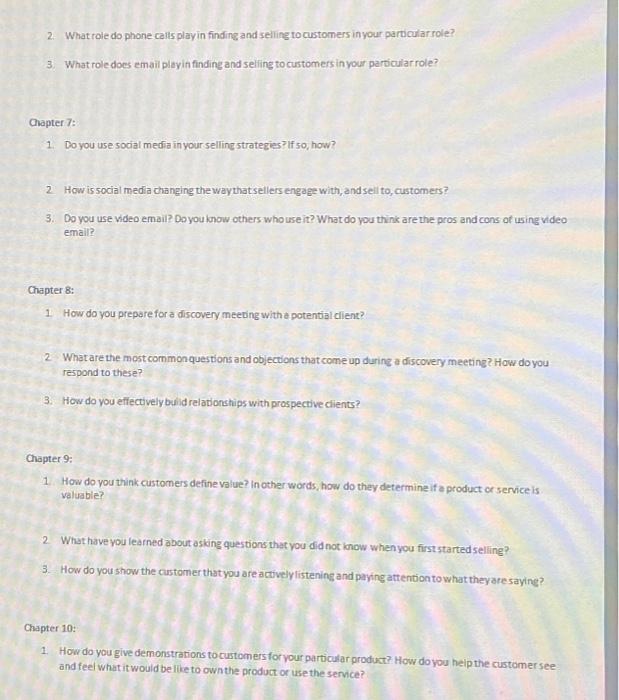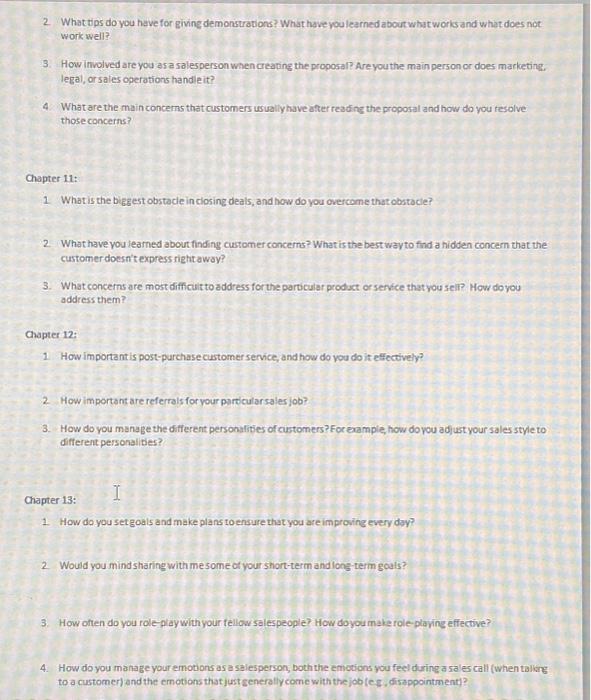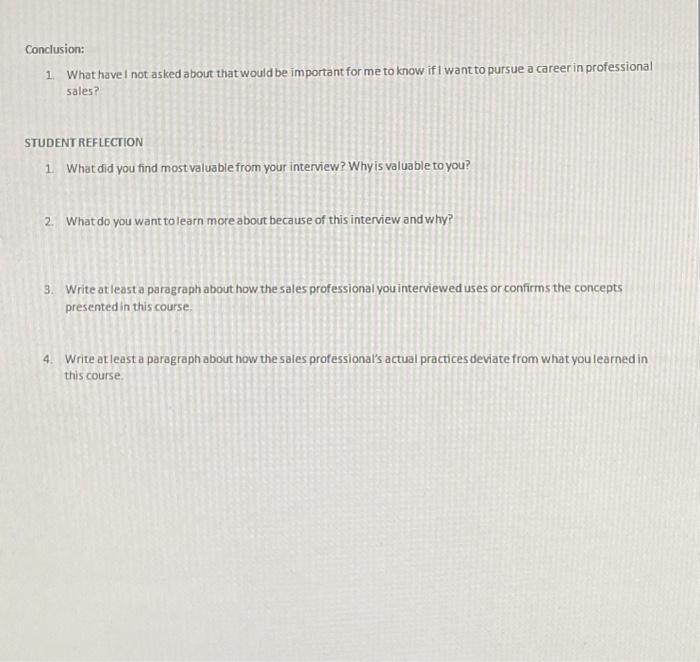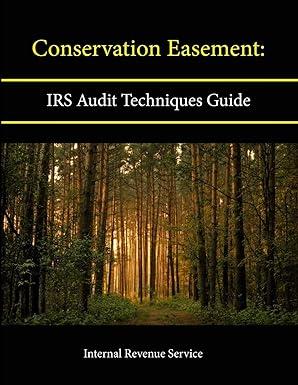This project is a comprehensive interview with a business-to-business sales professional. This is an OPTIONAL assignment and may be completed for extra credit in the course. To receive credit, the interview must be in-depth and the answers documented substantially. Additionally, you will complete 4 reflection questions about the interview and how what you learned relates to this course. Short, simple-sentence answers to the reflection questions will not receive credit. This is considered a comprehensive project and the information submitted should reflect that. 1. Download this Interview Worksheet. Sales Professional Interview Worksheet docx INSTRUCTIONS - Interview a Business-to-Business Salesperson of your choice and ask the following questions. Note that the person's title doesn't need to include the word "Sales," they can have any of the sales-related roles that are discussed in Chapter 1. (Account Manager, Client Success Manager, etc.) - Enter your Interviewee's answers to each question, below the question, ON THE WORKSHEET. - Complete the self-reflection questions. - Save your completed worksheet to your computer and upload it in Canvas as your submission for this assignment. Conclusion: 1. What have I not asked about that would be important for me to know if I want to pursue a career in professional sales? STUDENT REFLECTION 1. What did you find most valuable from your interview? Why is valuable to you? 2. What do you want to learn more about because of this interview and why? 3. Write at least a paragraph about how the sales professional you interviewed uses or confirms the concepts presented in this course. 4. Write at least a paragraph about how the sales professional's actual practices deviate from what you learned in this course. 2. What role do phone calls play in finding and seling to customers in your particular role? 3. What role does email pleyin finding and seling to customers in your particular role? Ohapter 7: 1. Do you use social media in your selling strategies? If so, how? 2. How is social media changing the way that sellers engage with, and sell to, customers? 3. Do you use video email? Do you know others who use it? What do you think are the pros and cons of using video emall? Chapter 8: 1 How do you prepare for a discovery meeting with e potential client? 2. What are the most common questions and objectons that come up during a discovery meeting? How do you respond to these? 3. How do you effectively buid relationships with prospective clients? Chapter 9: 1. How do you think customers define value? in other words, how do they determine if a product or service is valuabie? 2. What have you learned about asking questions that you did not know when you first started selling? 3. How do you show the customer that you are actively listening and paying attention to what theyare sayine? Chapter 10: 1. How do you give demonstrations to customers for your particular product? How do you heip the customer see and feel what it would be like to own the product or use the service? 3. What value does your product or service offer to people? How does knowing that this product offers helpful solutions increase your motivation to sell itto customers? Chapter 3: 1. How does planning contribute to your success as a salesperson? 2 How often do you plan? 3. Whatare the most important dally activities that you perform? How do you plan and schedule these activities to make sure that you have sufficient time to complete them? 4. What are some less productive activites that you are required to engage in as a salesperson? What strategies do you utilize to ensure these activities don't monopolize your time? Chapter 4: 1 How important are metrics (eg, tracking your prospecting activiter or sales quoto progress) in measuring your performance? 2 Whatrole do metrics play in increasing a salesperson's motivation? 3. What role do metrics play in making strategic decisions? 4. Which metrics do you think are most important to your own success? 5. Whichmetrics do you think are most important when assessing whether client is a good cient? Chapter 5: 1 How important is it to understand your custorner? Why? 2. How does knowing the type of customer who is most likely to purchase your product help you use your time wisely? 3. Do you have a soles cadence that schedules when you reach out to clients and when? If so, how is it useful? 4. How do you follow up with potental customers without being a pest? Chapter 6: 1. What are the most effective funding methods for your business? Why do you think these methods are effective in your industry/with your ideal customer profie? MRKG 2333-Professional Sales Interview Worksheet INSTRUCTIONS - Interview a Business-to-Business Solesperson of your choice and ask the following questions. Note that the person's title doesn't need to include the word "Sales," they can have any of the sales related roles that are discussed in Chapter 1 (Account Manager, Oient Success Manager, etc) - Enter your Intervewee's answers to each quertion, below thequestion, ON THIS DOCUMENT. - Complete the self-reflectionquestions. - Save your completed worlsheet to your computer and upload it in Carvas as your submission for this assignment. SALES PROFESSIONALINFORMATION Name: Email Address: Business Name: Business Website: INTERVIEW QUESTIONS Chapter 1: 1. List the interviewee's name, title, email address, and the name of the company where he/she works: 2. What does your typical day- to-day schedule look tike? 3. How do you build thusting relationships with customers? Why is building relationships important? 4. What role do vou play in creatine value for your customers? 5. Why is your role important to the success of the company? Chapter 2: 1. How do you deal with the negative parts of your job, such as facing rejection? 2. Do you have a WHY statement? If so, what is it and how does it keep you motivated? 2. What tips do you have for giving demonstrations? What have you learned abour what worls and what does not work well? 3. How involved are you as a salesperson whencreating the proposal? Are you the main person or does marketing. legal, or saies operations handleit? 4. What are the main concerns that customers usually have after reading the proposal and how do you resolve thoseconcerns? Chapter 11: 1 What is the biggest obstacle in closing deals, and how do you overcame that obstacle? 2. What have you leamed about finding customer concerns? What is the best way to find a hidden concern that the customer doesn'texpress riehtaway? 3. What concerns are most difficuitto address for the particular product or senice that you sell? How do you address them? Chapter 12: 1. How important is post-purchase customer service, and how do vou do it effectively? 2. How importantare referrals for vour particular sales job? 3. How do you manage the different personalities of curtomers? Focexample, how do you adjust your sales style to different personalider? Chapter 13: 1. How do you set goals and make plans to ensure that you are im proving every doy? 2. Would you mind sharing with me some of your short-term and long term goals? 3. How often do you role-play with your fellow salespeople? How doyou make role plaving effective? 4. How do you manage your emotions as a saiesperson, both the emctions you feel during a sales call (when talkrg to a customer) and the emotions that just generally come with the job (eg, disappointment? This project is a comprehensive interview with a business-to-business sales professional. This is an OPTIONAL assignment and may be completed for extra credit in the course. To receive credit, the interview must be in-depth and the answers documented substantially. Additionally, you will complete 4 reflection questions about the interview and how what you learned relates to this course. Short, simple-sentence answers to the reflection questions will not receive credit. This is considered a comprehensive project and the information submitted should reflect that. 1. Download this Interview Worksheet. Sales Professional Interview Worksheet docx INSTRUCTIONS - Interview a Business-to-Business Salesperson of your choice and ask the following questions. Note that the person's title doesn't need to include the word "Sales," they can have any of the sales-related roles that are discussed in Chapter 1. (Account Manager, Client Success Manager, etc.) - Enter your Interviewee's answers to each question, below the question, ON THE WORKSHEET. - Complete the self-reflection questions. - Save your completed worksheet to your computer and upload it in Canvas as your submission for this assignment. Conclusion: 1. What have I not asked about that would be important for me to know if I want to pursue a career in professional sales? STUDENT REFLECTION 1. What did you find most valuable from your interview? Why is valuable to you? 2. What do you want to learn more about because of this interview and why? 3. Write at least a paragraph about how the sales professional you interviewed uses or confirms the concepts presented in this course. 4. Write at least a paragraph about how the sales professional's actual practices deviate from what you learned in this course. 2. What role do phone calls play in finding and seling to customers in your particular role? 3. What role does email pleyin finding and seling to customers in your particular role? Ohapter 7: 1. Do you use social media in your selling strategies? If so, how? 2. How is social media changing the way that sellers engage with, and sell to, customers? 3. Do you use video email? Do you know others who use it? What do you think are the pros and cons of using video emall? Chapter 8: 1 How do you prepare for a discovery meeting with e potential client? 2. What are the most common questions and objectons that come up during a discovery meeting? How do you respond to these? 3. How do you effectively buid relationships with prospective clients? Chapter 9: 1. How do you think customers define value? in other words, how do they determine if a product or service is valuabie? 2. What have you learned about asking questions that you did not know when you first started selling? 3. How do you show the customer that you are actively listening and paying attention to what theyare sayine? Chapter 10: 1. How do you give demonstrations to customers for your particular product? How do you heip the customer see and feel what it would be like to own the product or use the service? 3. What value does your product or service offer to people? How does knowing that this product offers helpful solutions increase your motivation to sell itto customers? Chapter 3: 1. How does planning contribute to your success as a salesperson? 2 How often do you plan? 3. Whatare the most important dally activities that you perform? How do you plan and schedule these activities to make sure that you have sufficient time to complete them? 4. What are some less productive activites that you are required to engage in as a salesperson? What strategies do you utilize to ensure these activities don't monopolize your time? Chapter 4: 1 How important are metrics (eg, tracking your prospecting activiter or sales quoto progress) in measuring your performance? 2 Whatrole do metrics play in increasing a salesperson's motivation? 3. What role do metrics play in making strategic decisions? 4. Which metrics do you think are most important to your own success? 5. Whichmetrics do you think are most important when assessing whether client is a good cient? Chapter 5: 1 How important is it to understand your custorner? Why? 2. How does knowing the type of customer who is most likely to purchase your product help you use your time wisely? 3. Do you have a soles cadence that schedules when you reach out to clients and when? If so, how is it useful? 4. How do you follow up with potental customers without being a pest? Chapter 6: 1. What are the most effective funding methods for your business? Why do you think these methods are effective in your industry/with your ideal customer profie? MRKG 2333-Professional Sales Interview Worksheet INSTRUCTIONS - Interview a Business-to-Business Solesperson of your choice and ask the following questions. Note that the person's title doesn't need to include the word "Sales," they can have any of the sales related roles that are discussed in Chapter 1 (Account Manager, Oient Success Manager, etc) - Enter your Intervewee's answers to each quertion, below thequestion, ON THIS DOCUMENT. - Complete the self-reflectionquestions. - Save your completed worlsheet to your computer and upload it in Carvas as your submission for this assignment. SALES PROFESSIONALINFORMATION Name: Email Address: Business Name: Business Website: INTERVIEW QUESTIONS Chapter 1: 1. List the interviewee's name, title, email address, and the name of the company where he/she works: 2. What does your typical day- to-day schedule look tike? 3. How do you build thusting relationships with customers? Why is building relationships important? 4. What role do vou play in creatine value for your customers? 5. Why is your role important to the success of the company? Chapter 2: 1. How do you deal with the negative parts of your job, such as facing rejection? 2. Do you have a WHY statement? If so, what is it and how does it keep you motivated? 2. What tips do you have for giving demonstrations? What have you learned abour what worls and what does not work well? 3. How involved are you as a salesperson whencreating the proposal? Are you the main person or does marketing. legal, or saies operations handleit? 4. What are the main concerns that customers usually have after reading the proposal and how do you resolve thoseconcerns? Chapter 11: 1 What is the biggest obstacle in closing deals, and how do you overcame that obstacle? 2. What have you leamed about finding customer concerns? What is the best way to find a hidden concern that the customer doesn'texpress riehtaway? 3. What concerns are most difficuitto address for the particular product or senice that you sell? How do you address them? Chapter 12: 1. How important is post-purchase customer service, and how do vou do it effectively? 2. How importantare referrals for vour particular sales job? 3. How do you manage the different personalities of curtomers? Focexample, how do you adjust your sales style to different personalider? Chapter 13: 1. How do you set goals and make plans to ensure that you are im proving every doy? 2. Would you mind sharing with me some of your short-term and long term goals? 3. How often do you role-play with your fellow salespeople? How doyou make role plaving effective? 4. How do you manage your emotions as a saiesperson, both the emctions you feel during a sales call (when talkrg to a customer) and the emotions that just generally come with the job (eg, disappointment
